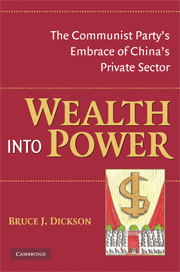Book contents
- Frontmatter
- Contents
- List of Tables and Figure
- Acknowledgments
- 1 Introduction
- 2 The Party's Promotion of the Private Sector
- 3 Co-opting the Capitalists
- 4 Bridges and Branches: The CCP's Institutional Links to the Private Sector
- 5 Views on the Economic, Political, and Social Environments
- 6 Private Entrepreneurs in Public Service: Participation in China's Formal Political Institutions
- 7 The Ripple Effects of Privatization: Corruption, Inequality, and Charity
- 8 Conclusion
- Appendix: Survey Design
- Bibliography
- Index
2 - The Party's Promotion of the Private Sector
Published online by Cambridge University Press: 05 September 2012
- Frontmatter
- Contents
- List of Tables and Figure
- Acknowledgments
- 1 Introduction
- 2 The Party's Promotion of the Private Sector
- 3 Co-opting the Capitalists
- 4 Bridges and Branches: The CCP's Institutional Links to the Private Sector
- 5 Views on the Economic, Political, and Social Environments
- 6 Private Entrepreneurs in Public Service: Participation in China's Formal Political Institutions
- 7 The Ripple Effects of Privatization: Corruption, Inequality, and Charity
- 8 Conclusion
- Appendix: Survey Design
- Bibliography
- Index
Summary
The process of economic privatization in China has been driven by a combination of local initiatives and central directives, as well as debates among CCP leaders about the proper pace and scope of economic reform in general and privatization in particular. Over time, the CCP has revised the legal and institutional framework for supporting the private sector, including property rights, financing, and marketing. In the early reform era, private entrepreneurs were viewed with suspicion by both state and society, and many of them had suspect political and criminal backgrounds. Over time, a more ambivalent image emerged. On the one hand, they were seen as contributing to China's modernization and rewarded with prestigious public roles (ironically even being chosen as “model workers”). On the other hand, they were also blamed for contributing to growing inequality and corruption, politically salient issues that have threatened stability, especially in recent years. This ambivalent image was matched by equally ambivalent policies: while the third generation of leaders (symbolized by Jiang Zemin) pursued an elitist strategy of promoting economic interests, the fourth generation (symbolized by Hu Jintao) has pursued more populist policies designed to maintain the benefits of rapid economic growth while minimizing their social costs and potential political risks.
The growth in China's private sector has been achieved through two separate paths. The first, which began at the start of the post-Mao reform era, was the indigenous development of individually owned (getihu) and private enterprises (siying qiye).
- Type
- Chapter
- Information
- Wealth into PowerThe Communist Party's Embrace of China's Private Sector, pp. 32 - 65Publisher: Cambridge University PressPrint publication year: 2008



